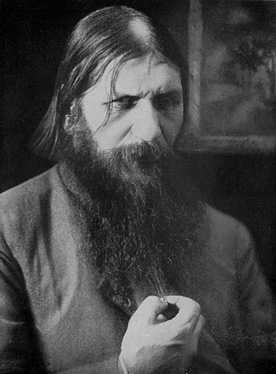For you guys who dun noe who is Rasputin..
"Rasputin was the scandalous 'mad monk' of Tsarist Russia .His nickname, Rasputin, means debauched one, and he'd already earned it, by his wild and licentious behaviour, when he was in his teens. But was he an enigmatic mystic, a political rogue or a skilled manipulator of innocent women? Contrary to popular belief, he was neither a monk nor a priest, but a wandering peasant who eventually exerted a powerful influence over Nicholas II, the last Tsar of imperial Russia."
"Rasputin was born Grigori Yefimovich Novykh in the small Siberian village of Pokrovskoe. There was talk of young Rasputin's visions and ability to heal, but he settled into peasant life, marrying at the age of 20 and having four children. A visit to a monastery in Verkhoturye changed him, however. Here he encountered a secret sect called the khlysty, which profoundly influenced him. They gathered in crypts, indulging in flagellation, mad dancing and orgiastic sex. Only after sinning could they repent and come closer to God. This mix of religious piety and sexual hedonism, 'driving out sin with sin', was a notion that never left Rasputin.
In 1901 he quit his home to become a 'strannik', a pilgrim or wanderer. He stopped washing and didn't touch his body for months on end. In an effort to gain spirituality, he sometimes wore shackles to increase the hardship of his journey. When he reached St Petersburg in 1903 he was perceived by those he encountered to have a luminescent religious essence. He was now a 'staryet', a wandering holy man. "
"In St Petersburg, Rasputin quickly impressed Bishop Theophan, the Tsar's confessor, and in 1905 he introduced Rasputin to the Montenegrin princesses, Militsa and Anastasia. Despite his unwashed smell, the sisters – dubbed 'the crows' by Russian society for their jet-black hair and fascination with the occult – were captivated.
The presence of a holy man with healing powers excited them, and, in 1906, despite Theophan's growing doubts, Militsa persuaded Nicholas II and Aleksandra, the Tsar and Tsarina, to let Rasputin look at their son, Aleksei. He was thought to suffer from haemophilia, but his illness was a state secret. Mysteriously, Rasputin knew all about it. Stranger still, when he prayed over the young Aleksei, the boy's haemorrhaging stopped. The Tsarina fell firmly under Rasputin's spell.
Rasputin did not waste this advantage and told Aleksandra, often described as a gullible and neurotic woman, that the boy would die without him. He became a regular palace visitor.
Other society women were also falling for Rasputin's hypnotic charms. One, Olga Lokhtina, invited him to stay in her home. She became a lifelong devotee, changing from a witty, intelligent socialite into a crazed eccentric. On one occasion Rasputin was observed violently beating her while she held on to his penis, shouting: 'I am your ewe, and you are Christ.' Other women claimed he'd raped them. "
"
Unholy behaviour
In late 1908, General Dedylin, responsible for the Tsar's security, presented a report to Nicholas documenting Rasputin's unsavoury actions: outings to bathhouses, beatings and violent sex with society women and prostitutes. He was also rumoured to have kept virgins' hair. Tyutchera, the royal governess, even claimed that Rasputin had been abusing the Tsar's children. By this time, however, the Siberian peasant was calling the Tsar and Tsarina Mama and Papa. Nicholas laughed off the report.
Others were not so blind: Theophan tried to warn the Tsar to distance himself from Rasputin, but he was relieved of his post and banished. In 1911 two former supporters of Rasputin, Illiodor, a fanatical right-wing monk, and Hermogen, Bishop of Saratov, brutally attacked Rasputin. They were exiled. "
"Rasputin's position in St Petersburg was already secure, but in 1912 it was reinforced by one of the most famous demonstrations of his healing power. The Romanovs went on holiday to Spala in Poland and Aleksei became ill. Fearing for her son's life, the distraught Tsarina contacted Rasputin, begging for help. He telegraphed back, saying the 'little one' would not die. The boy immediately recovered.
Today it is believed that Aleksei may have actually been suffering from aplastic anaemia. This disease carries many of the same symptoms as haemophilia – pallor, internal haemorrhaging, high fevers and delirium – but is characterised by spontaneous remission. Rasputin may simply have been blessed with good timing. Whatever the truth, Rasputin's reputation as a healer flourished and he began to receive dozens of visitors. "



